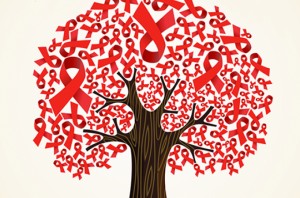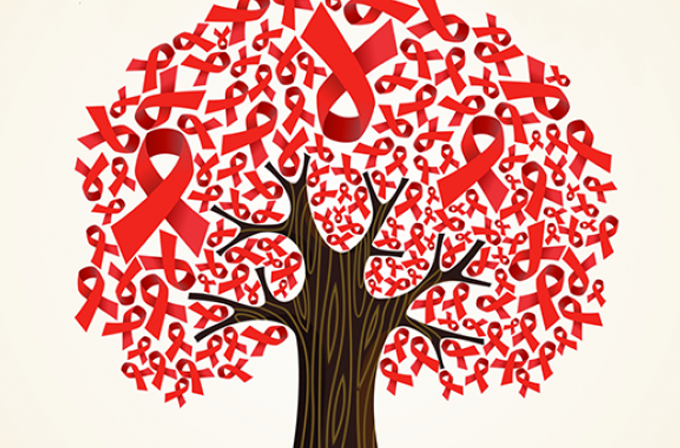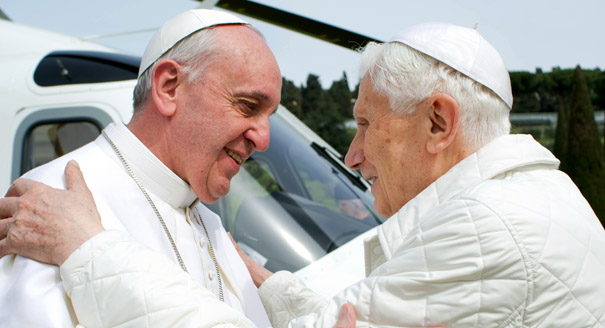 December 1st was World AIDS Day. Here’s are some of my previous posts: from 2014 and from 2012. But this year, in addition to reporting the new statistics we have a papal interview to unpack and analyze. Has the pope said anything new? Honestly, I’m still trying to interpret it myself.
December 1st was World AIDS Day. Here’s are some of my previous posts: from 2014 and from 2012. But this year, in addition to reporting the new statistics we have a papal interview to unpack and analyze. Has the pope said anything new? Honestly, I’m still trying to interpret it myself.
First, let’s report the good news. According to UNAIDS:
The world has halted and reversed the spread of HIV. The epidemic has been forced into decline. New HIV infections and AIDS-related deaths have fallen dramatically since the peak of the epidemic. Now the response is going one step further–ending the AIDS epidemic by 2030. (AIDS by the Numbers, 3)
- 15.8 million people living with HIV are accessing antiretroviral therapy, up from 13.6 million the year before.
- New HIV infections have fallen by 35% since 2000.
- New HIV infections among children have declined by 58% since 2000.
- AIDS-related deaths have fallen by 42% since the peak in 2004.
- Tuberculosis-related deaths in people living with HIV have fallen by 32% since 2004.
It is worth noting that the Catholic Church has been deeply involved in addressing HIV for decades. Catholic Relief Services, for example, has 37 projects in 22 countries supporting more than 7 million people living with or affected by HIV.
Interested Americans can read more about PEPFAR and the National HIV/AIDS Strategy at this link posted on World AIDS Day.
What’s the bad news? Well, for starters, AIDS has not gone away.
- 36.9 million people were living with HIV at the end of 2014.
- 2 million people became newly infected with HIV in 2014.
- 1.2 million people died from AIDS-related illnesses in 2014.
According to the UNAIDS report cited earlier, “HIV continues to shine a harsh light on the inequalities of the world. AIDS is unfinished business.”
So what did Pope Francis say?
Pope Francis just concluded a trip to Africa where he went to Uganda, Kenya, and the Central African Republic. CMT’s Meg Clark reflects on her experience at the papal visit in Kenya here, and Josh McElwee’s reporting for NCR is here, here, and here. The pope’s visit highlighted his concern for the poor, and he repeatedly called for an end to violence and care for those most vulnerable. It is not surprising, then, that he would be asked, when on board the plane after this apostolic visit, about HIV and AIDS, especially since it was World AIDS Day.
According to the Zenit press release and transcript, Jurgen Baetz asked the pope:
Holiness, AIDS is devastating Africa. Care helps many today to live a bit longer. However, the epidemic continues. Last year, in Uganda alone, there were 135,000 new infections of AIDS. In Kenya the situation is in fact worse. AIDS is the first cause of death among African young people. Holiness, you met HIV-positive children and heard a moving testimony in Uganda. Yet, you said very little on this issue. We know that prevention is fundamental. We also know that condoms are not the only means to halt the epidemic. We know, however, that it’s an important part of the answer. Isn’t it time, perhaps, to change the position of the Church for this purpose? To agree to the use of condoms in order to prevent further infections?
And Pope Francis responded:
The question seems to me too narrow and it also seems a partial question. Yes, it is one of the methods; I think that the morality of the Church finds itself on this point before a perplexity: is it the fifth or the sixth Commandment? To defend life, or that the sexual relation be open to life? But this isn’t the problem. The problem is greater. This question makes me think of that which was posed to Jesus once: “Tell me, Teacher, is it licit to cure on the Sabbath?” It’s obligatory to cure! This question, if it’s licit to cure … But malnutrition, the exploitation of persons, slave labor, the lack of potable water: these are the problems. Let us not ask ourselves if this or that band-aid can be used for a small wound. The great wound is social injustice, environmental injustice, the injustice I’ve mentioned of exploitation, and malnutrition. This exists. I don’t like to descend to such casuistic reflections, when people are dying from lack of water and from hunger, from <lack of> a dwelling … When all are cured, or when there are no longer these tragic sicknesses caused by man, be it because of social injustice, be it to earn more money – think of the arms trade! – when these problems no longer exist, I believe the question can be asked: “Is it licit to cure on the Sabbath?” Why do arms continue to be produced and traded? The wars are the greatest cause of mortality … I would say forget about thinking if it’s licit or illicit to cure on the Sabbath. I would say to humanity: do justice, and when all are cured, when there is no longer injustice in this world, then we can speak of the Sabbath.
How should we interpret this?
First, let’s figure out what Scriptural passages the pope is applying here. In Matthew 12:9-14 we have the story of Jesus curing the man with the withered hand on the sabbath:
9 He left that place and entered their synagogue; 10 a man was there with a withered hand, and they asked him, “Is it lawful to cure on the sabbath?” so that they might accuse him. 11 He said to them, “Suppose one of you has only one sheep and it falls into a pit on the sabbath; will you not lay hold of it and lift it out? 12 How much more valuable is a human being than a sheep! So it is lawful to do good on the sabbath.” 13 Then he said to the man, “Stretch out your hand.” He stretched it out, and it was restored, as sound as the other. 14 But the Pharisees went out and conspired against him, how to destroy him.
Mark and Luke have slight variations of this story (Mk 3:2, Lk 6:7, 13:14, 14:3). Even John has a version of this teaching in 5:1-18.
Pope Francis remarks immediately: “It’s obligatory to cure!”
On the one hand, the pope seems to be saying that following Jesus means curing–in the gospel context even curing when it is ‘against the rules.’ One should always ‘do good.’ Often this passage is a resource when people want to talk about the letter of the law versus the spirit of the law. The reason the Pharisees were disappointed was because Jesus broke the law, but Jesus broke the law in order to do good, thereby subverting his disciples’ understanding of the law.
But by comparing Gaetz’s question to the question of the Pharisees, the pope seems to be saying that in our own day, church critics and public health scholars are like the annoying Pharisees, always asking the wrong questions. “I don’t like to descend to such casuistic reflections,” he says, citing the bigger issues of social injustices.
Certainly, social analysis is an important lens for understanding the AIDS pandemic. This is not disputed in the literature. But that’s not what Baetz asked about. Baetz offered a nuanced question, and I think Pope Francis gives a non-answer.
The pope concludes by telling us to “do justice.” He doesn’t seem to see condom use as a part of that justice approach, even comparing it to a bandage for a wound. Despite having recently heard the testimonies of people living with HIV on the continent most devastated by AIDS, the pope didn’t have a well thought out response to this pressing question.
Reaction has been mixed. Michael Sean Winters wrote that he does not find the answer confusing.
I think his answer displays not only a certain wiliness, unwilling to be pigeon-holed, but that the pope is again asking us to focus less on people’s sexual practices and more on their abysmal living conditions. He wants us to be as offended by the gross poverty in our world as by the sexual misdeeds of others.
Ken Briggs similarly argues that the pope has a pattern of “hard selling his passionate concerns and soft-pedaling or by-passing others.” Briggs concludes:
From his indirection and pregnant gestures, his legacy is likely to uphold him as the pope of conscience, leaving others to draw inferences from his signs and intimations. Rather than change the rules, he is showing a pattern whereby he tamps down the significance of certain combative issues–they’re no big deal–while hoping Catholics will take the hint with more and more leaving them off the list of cafeteria favorites. Over the long run, change would presumably happen.
I have serious concerns about this approach. Downplaying the condom question has big consequences. First, it risks making church teaching look contrary to public health and epidemiology, even as we argue that faith and reason are interrelated and that the best theology must rely on good data and pay attention to the ‘signs of the times.’ Second, for whom is AIDS ‘no big deal’? Any rhetoric that downplays the condom issue might make sense if you are a privileged person unaffected by HIV who doesn’t want to be bothered by the realities of an illness that killed 1.2 million people last year and infected 2 million more. A third related concern is that it really is impossible to separate the sexual and the social. So the pope says he wants us to focus on social injustice and that is good, but sexual (‘pelvic issues’ according to Winters) issues don’t exist in a vaccum. Sexuality is part of our human embodied reality and sexual issues are as much about power, justice, and life as any so-called ‘social’ issues.
Many theological ethicists have been drawing helpful connections between sexual ethics and social ethics (see the works of Margaret Farley, Patricia Beattie Jung, Melissa Browning, Elisabeth Vasko, Evelyn and James Whitehead, and my own book on this too).
The condom question is complicated. There are no easy answers. But downplaying the issue is not a helpful way forward. Church teachings matter. They are supposed to express the faith of the church. And Church teachings directly impact spending priorities in our direct aid (influencing, for example, how Catholic Relief Services addresses HIV prevention in the 22 countries in which it operates). More needs to be done on this thorny issue so that Catholic teaching fully communicates to all people affected by HIV/AIDS today that their lives matter and that the Church is fighting for their lives.





Interesting article. I had a different take on the Pope’s answer.
It was against the “law” to work on the Sabbath and some people used that as an excuse to let people suffer. Jesus healed even on the Sabbath.
Relating this to AIDS and condoms.
It is against the “law” to use condoms to prevent pregnancy and some people use this as an excuse to let people suffer… Using condoms could prevent human suffering. The Pope in my opinion was advocating for people in the same way that Jesus did. It wasn’t a hard lesson to discern.